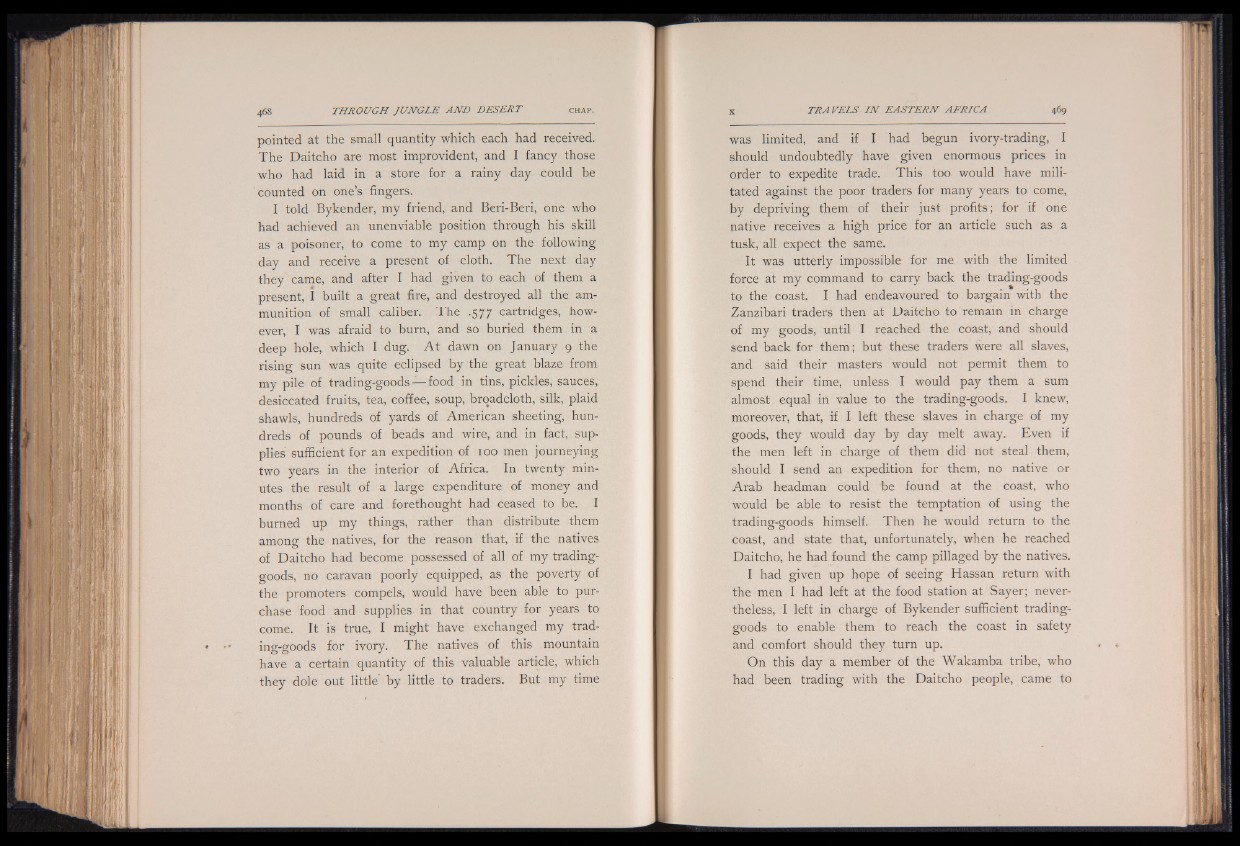
pointed at the small quantity which each had received.
The Daitcho are most improvident, and I fancy those
who had laid in a store for a rainy day could be
counted on one’s fingers.
I told Bykender, my friend, and Beri-Beri, one who
had achieved an unenviable position through his skill
as a poisoner, to come to my camp on the following
day and receive a present of cloth. The next day
they came, and after I had given to each of them a
present, I built a great fire, and destroyed all the ammunition
of small caliber. The .577 cartridges, however,
I was afraid to burn, and so buried them in a
deep hole, which I dug. A t dawn on January 9 the
rising sun was quite eclipsed by the great blaze from
my pile of trading-goods — food in tins, pickles, sauces,
desiccated fruits, tea, coffee, soup, broadcloth, silk, plaid
shawls, hundreds of yards of American sheeting, hundreds
of pounds of beads and wire, and in fact, supplies'
sufficient for an expedition of 100 men journeying
two years in the interior of Africa. In twenty minutes
the result of a large expenditure of money and
months of care and forethought had ceased to be. I
burned up my things, rather than distribute them
among the natives, for the reason that, if the natives
of Daitcho had become possessed of all of my trading-
goods, no caravan poorly equipped, as the poverty of
the promoters compels, would have been able to purchase
food and supplies in that country for years to
come. It is true, I might have exchanged my trad-
ing-goods for ivory. The natives of this mountain
have a certain quantity of this valuable article, which
they dole out little by little to traders. But my time
was limited, and if I had begun ivory-trading, I
should undoubtedly have given enormous prices in
order to expedite trade. This too would have militated
against the poor traders for many years to come,
by depriving them of their just profits; for if one
native receives a high price for an article such as a
tusk, all. expect the same.
It was utterly impossible for me with the limited
force at my command to carry back the trading-goods
to the coast. I had endeavoured to bargain with the
Zanzibari traders then at Daitcho to remain in charge
of my goods, until I reached the coast, and should
send back for them; but these traders were all slaves,
and said their masters would not permit them to
spend their time, unless I would pay them a sum
almost equal in value to the trading-goods. I knew,
moreover, that, if I left these slaves in charge of my
goods, they would day by day melt away. Even if
the men left in charge of them did not steal them,
should I send an expedition for them, no native or
Arab headman could be found at the coast, who
would be able to resist the temptation of using the
trading-goods himself. Then he would return to the
coast, and state that, unfortunately, when he reached
Daitcho, he had found the camp pillaged by the natives.
I had given up hope of seeing Hassan return with
the men I had left at the food station at Sayer; nevertheless,
I left in charge of Bykender sufficient trading-
goods to enable them to reach the coast in safety
and comfort should they turn up.
On this day a member of the Wakamba tribe, who
had been trading with the Daitcho people, came to